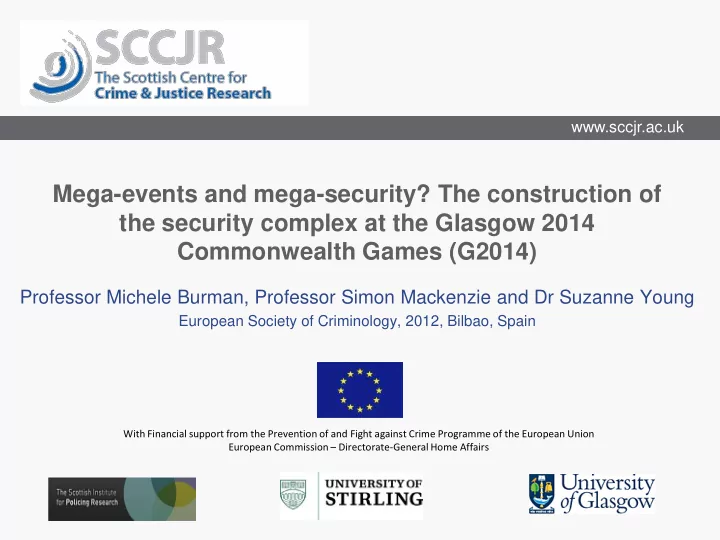

www.sccjr.ac.uk Mega-events and mega-security? The construction of the security complex at the Glasgow 2014 Commonwealth Games (G2014) Professor Michele Burman, Professor Simon Mackenzie and Dr Suzanne Young European Society of Criminology, 2012, Bilbao, Spain With Financial support from the Prevention of and Fight against Crime Programme of the European Union European Commission – Directorate-General Home Affairs
www.sccjr.ac.uk Overview of G2014 • 1.5 Million Spectators • £27 million security • 6,500 athletes • 1,100 police officers • 11 days competition • 3,000 private security personnel “To Host A Safe, Secure and Peaceful Games”
www.sccjr.ac.uk Mega-events as a study of security Security Governance Culture Cultural ideologies of High Internationalisation of risk of security Security Political and bureaucratic contexts of security
www.sccjr.ac.uk Governing at a Distance On the one hand there has been a concerted attempt by central government especially in the UK) to reach out beyond its own criminal justice organizations and to activate crime reduction activity on the part of individual citizens, communities, commercial concerns, and other elements of civil society. In a sharp reversal of the long term tendency towards the monopolization of crime control by specialist government agencies, the state has begun to make efforts to ‘de-differentiate’ the social response-that is, to spread out the crime control effort beyond the specialist state organizations that previously sought to monopolize it . (Garland, 2001: 17)
www.sccjr.ac.uk
www.sccjr.ac.uk Responsibilization Strategy The attempt to extend the reaches of state agencies by linking them up with the practices of actors in the private sector’ and the ‘community’ might be described as a responsibilization strategy. It involves a way of thinking and a variety of techniques designed to change the manner in which governments act upon crime…[T]his approach promotes a new kind of indirect action, in which state agencies activate action by non- state organizations and actors. (Garland, 2001: 124)
www.sccjr.ac.uk Security Responsibilization • Risk and Blame – SP111: You’ll understand the police being the police, we’re quite thorough in as much as we record things and if we make any recommendations, we ensure should they be adopted or not, we record the rationale behind that, we would go back to that and make sure there’s an audit trail of our thinking . • Actuarial Security – SP101: Different risks are owned by different individuals, so the security risks tend to be owned by the police, some are owned by the Organising Committee, some of the political risks are owned by the Organising Committee, most are owned by Glasgow City Council or the Scottish Government. On the planning team we’re on time, we’re on budget and we’re working with our partners, some of them really well. – SP103: The Organising Committee’s are very driven by budget, they have a limited budget, any increase in budget is bad from a reputational point of view
www.sccjr.ac.uk States of Exception and Techniques of Neutralisation • Mega-events are states of exception – everyday security models replaced with ideologies of high security • High security events offer a technique to neutralise high security sensibilities
Recommend
More recommend